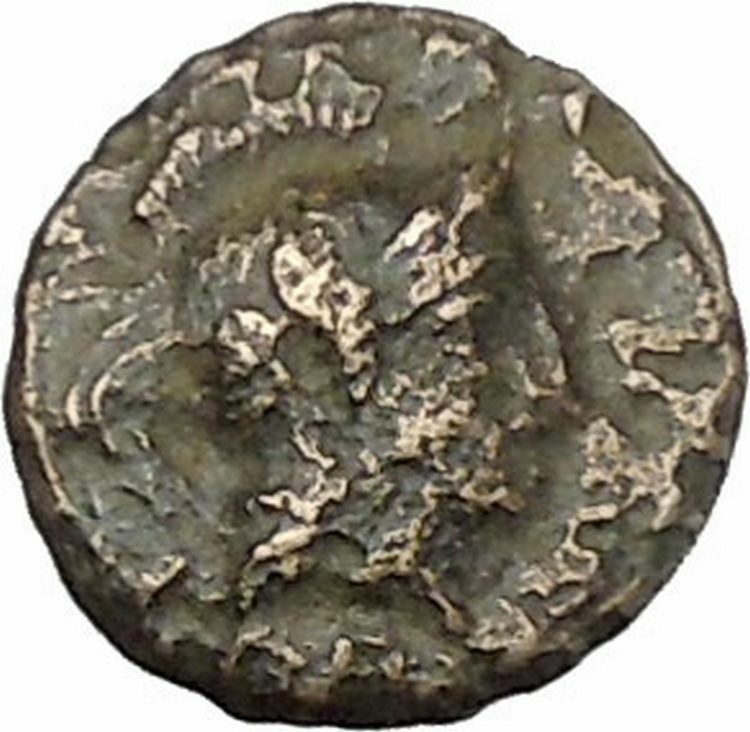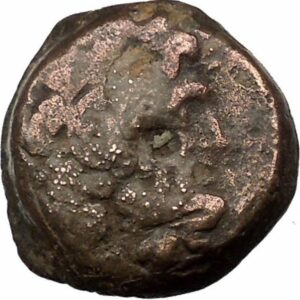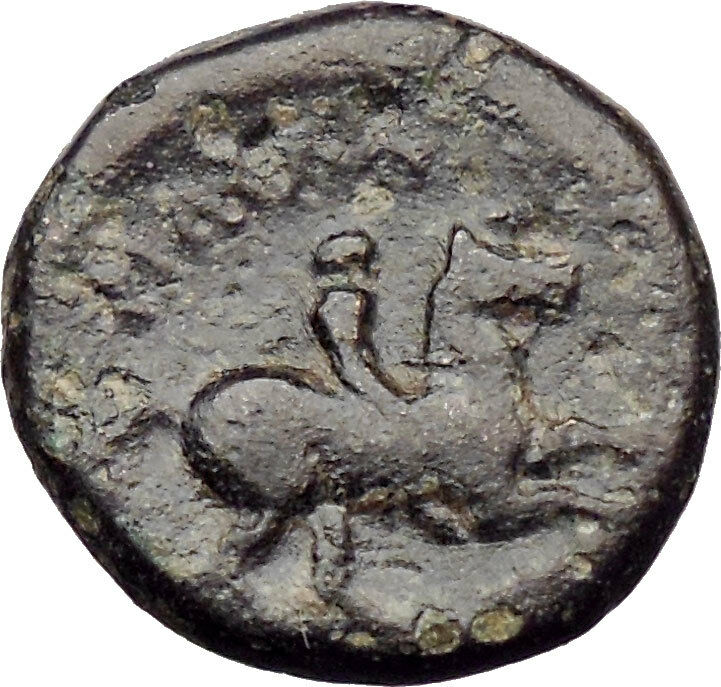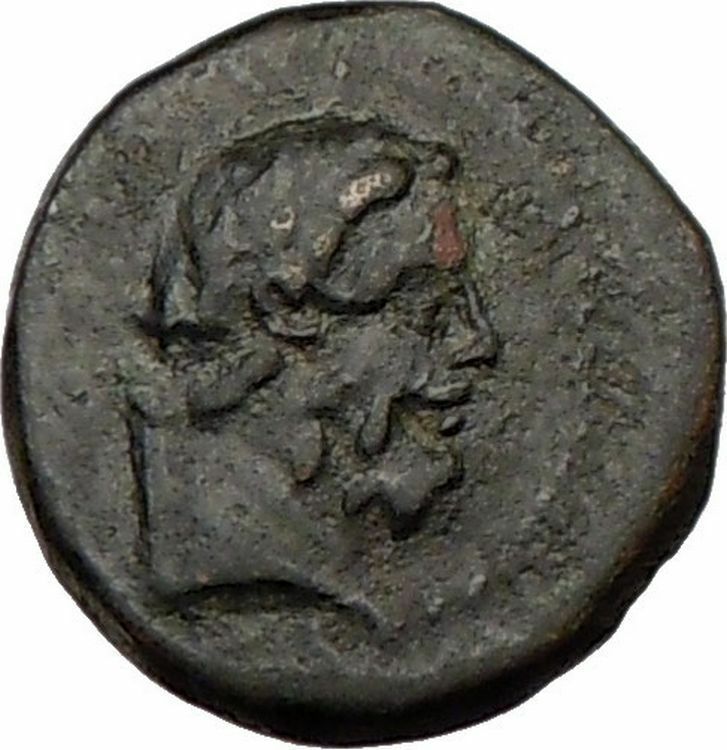|
Greek city of
Thebes
in
Boiotia
Silver Tetartemorion 9mm (0.21 grams) Struck
circa 426-395 B.C.
Reference:
Danish Sylloge, 296
Pedigree: Ex-BCD Collection with his original hand-written ticket
Boiotian shield.
Grape bunch on vine; Θ – Ε below.
Thebes-the principal city of Boeotia, Thebes was frequently in conflict with
Athens and actually assisted the Persian invaders in 480/479 B.C. This great
city was the arch-rival of Athens, and supported Sparta during the Peloponnesian
war. Later, the Thebans defeated their former allies and became the most
powerful state in Greece (371 B.C.). This position was soon usurped by Philip II
of Macedon who inflicted a crushing defeat on the combined forces of Thebes and
Athens in 338 B.C. Two years later Thebes was utterly destroyed by Alexander the
Great, and although partially restored by Kassander it never again recovered its
political influence in Greece.
You are bidding on the exact
item pictured, provided with a Certificate of Authenticity and Lifetime
Guarantee of Authenticity.
Thebes (Θῆβαι) was a
Boeotian
city-state
(polis), situated
to the north of the
Cithaeron
range, which divides
Boeotia
from
Attica
, and on the southern edge of the
Boeotian plain
. It played an important role in the fabric of
Greek myth
, as the site of the stories of
Cadmus
,
Oedipus
,
Dionysus
and others.
It was the largest city of the region of
Boeotia
and
was the leader of the Boeotian confederacy. It was a major rival of
Athens
, and
sided with the Persians during the 480 BC invasion of
Xerxes
. Theban forces ended the power of
Sparta
at the
battle of Leuctra
in 371 BC under the command of
Epaminondas
. The
Sacred Band of Thebes
(an elite military unit) famously fell at the battle
of
Chaeronea
in 338 BC against
Philip
II
and
Alexander
the Great
.
In the
Mycenaean
period it attracted attention from the invading
Dorians
, and
the fact of their eventual conquest of Thebes lie behind the stories of the
successive legendary attacks on that city. The central position and military
security of the city naturally tended to raise it to a commanding position among
the Boeotians, and from early days its inhabitants endeavoured to establish a
complete supremacy over their kinsmen in the outlying towns.
//
Classical
period

Map of the Topography of Ancient Thebes.
In the late
6th
century BC
, the Thebans were brought for the first time into hostile contact
with the Athenians
,
who helped the small village of
Plataea
to
maintain its independence against them, and in
506 BC
repelled an inroad into Attica. The aversion to Athens best serves to
explain the apparently unpatriotic attitude which Thebes displayed during the
Persian invasion of Greece
(480–479
BC). Though a contingent of 400 was sent to
Thermopylae
and remained there with
Leonidas
until just before the last stand when they surrendered to the
Persians, the governing aristocracy soon after joined King
Xerxes I of
Persia
with great readiness and fought zealously on his behalf at the
Battle of Plataea
in 479 BC
. The
victorious Greeks subsequently punished Thebes by depriving it of the presidency
of the
Boeotian League
and an attempt by the Spartans to expel it from the
Delphic
amphictyony
was only frustrated by the intercession of Athens.
In 457 BC
Sparta, needing a counterpoise against Athens in central Greece, reversed her
policy and reinstated Thebes as the dominant power in Boeotia. The great citadel
of Cadmea served this purpose well by holding out as a base of resistance when
the Athenians overran and occupied the rest of the country (457–447
BC). In the
Peloponnesian War
the Thebans, embittered by the support which Athens gave
to the smaller Boeotian towns, and especially to Plataea, which they vainly
attempted to reduce in
431 BC
, were
firm allies of Sparta, which in turn helped them to besiege Plataea and allowed
them to destroy the town after its capture in
427 BC
. In
424 BC
at the
head of the Boeotian levy they inflicted a severe defeat upon an invading force
of Athenians at the
Battle of Delium
,
and for the first time displayed the effects of that firm military organization
which eventually raised them to predominant power in Greece.
After the downfall of Athens at the end of the Peloponnesian War, the
Thebans, having learned that Sparta intended to protect the states which they
desired to annex, broke off the alliance. In
404 BC
they had
urged the complete destruction of Athens, yet in
403 BC
they
secretly supported the restoration of its democracy in order to find in it a
counterpoise against Sparta. A few years later, influenced perhaps in part by
Persian gold, they formed the nucleus of the league against Sparta. At the
Battle of
Haliartus
(395
BC) and the
Battle of Coronea
(394
BC) they again proved their rising military capacity by standing their
ground against the Spartans. The result of the war was especially disastrous to
Thebes, as the general settlement of
387 BC
stipulated the complete autonomy of all Greek towns and so withdrew the other
Boeotians from its political control. Its power was further curtailed in
382 BC, when a Spartan force
occupied the citadel by a treacherous coup-de-main. Three years later, the
Spartan garrison was expelled and a democratic constitution was set up in place
of the traditional oligarchy. In the consequent wars with Sparta, the Theban
army, trained and led by
Epaminondas
and
Pelopidas
,
proved itself the best in Greece (see also:
Sacred
Band of Thebes
). Years of desultory fighting, in which Thebes established
its control over all Boeotia, culminated in
371 BC
in a
remarkable victory over the pick of the Spartans at
Leuctra
. The
winners were hailed throughout Greece as champions of the oppressed. They
carried their arms into
Peloponnesus
and at the head of a large coalition, permanently crippled the
power of Sparta, in part by freeing many helot slaves, the basis of the Spartan
economy. Similar expeditions were sent to
Thessaly
and
Macedon
to regulate the affairs of those regions.
Fall
However, the predominance of Thebes was short-lived as the states which she
protected refused to subject themselves permanently to her control. Renewed
rivalry with Athens, who had joined with Thebes in
395 BC
in fear
of Sparta, but since
387 BC
had
endeavored to maintain the balance of power against her ally, prevented the
formation of a Theban empire. With the death of
Epaminondas
at the
Battle of Mantinea (362 BC)
the city sank again to the position of a
secondary power. In a war with the neighboring state of
Phocis
(356–346
BC) it could not even maintain its predominance in central Greece, and by
inviting
Philip
II of Macedon
to crush the Phocians it extended that monarch’s power within
dangerous proximity to its frontiers. A revulsion of feeling was completed in
338 BC
by the
orator Demosthenes
, who persuaded Thebes to join Athens in a final attempt to bar
Philip’s advance upon Attica. The Theban contingent lost the decisive
battle of Chaeronea
and along with it every hope of reassuming control over
Greece. Philip was content to deprive Thebes of her dominion over Boeotia; but
an unsuccessful revolt in
335 BC
against
his son
Alexander
was punished by Macedon and other Greek states by the destruction of the city,
except, according to tradition, the house of the poet
Pindar
and the
temples.
While he was triumphantly campaigning north, the Thebans and Athenians
rebelled once more. Alexander reacted immediately, but, while the other cities
once again hesitated, Thebes decided to resist with the utmost vigor. This
resistance was useless, however, as the city was razed to the ground amid great
bloodshed and its territory divided between the other Boeotian cities. Moreover,
the Thebans themselves were sold into
slavery
. Alexander spared only priests, leaders of the pro-Macedonian party
and descendants of Pindar
, whose house was the only one left standing. The end of Thebes cowed
Athens into submission. According to Plutarch, a special Athenian embassy, led
by Phocion
,
an opponent of the anti-Macedonian faction, was able to persuade Alexander to
give up his demand for the exile of leaders of the anti-Macedonian party, most
particularly
Demosthenes
.
|









